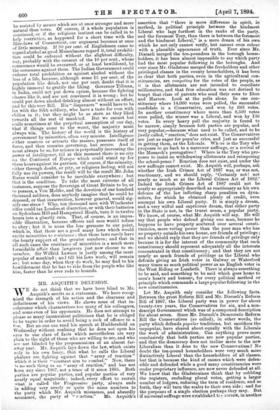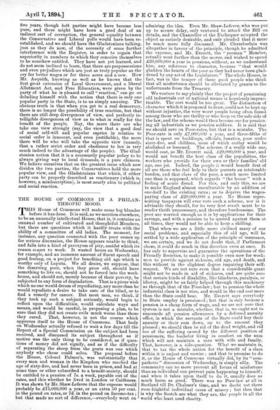MR. ASQTJITH'S DELUSION.
WE do not think that we have been blind to Mr. Asquith's merits as a statesman. We have recog- nised the strength of his action and the clearness and definiteness of his views. He shows none of that in- coherence which characterises too many of his colleagues, and some even of his opponents. He does not attempt to please so many inconsistent politicians that he is obliged to be vague in order to avoid being a rock of offence to a few. But no one can read his speech at Huddersfield on Wednesday without realising that he does not open his eves to one class of facts which nevertheless are very plain to the sight of those who are willing to see, and who are not blinded by the prepossessions of an almost far- away past. Mr. Asquith lays down the law, which exists .00ly in his own fancy, that what he calls the Liberal phalanx are fighting against that "army of reaction" which it is their 'constant aim to combat." Now, there ia no such thing as an "army of reaction," and has not Wen any since 1867, not a trace of it since 1885. Both parties are popular parties, and popular parties of very nearly equal magnitude ; indeed, every effort to recruit what is called the Progressive party, always ends in adding very nearly or quite the same numbers to the party. which Mr. Asquith misnames and absurdly misnames, the party of " naction." Par. Asquith's assertion that "there is more difference in spirit, in method, in political principle between the hindmost Liberal who lags furthest in the ranks of the party, and the foremost Tory, than there is between the foremost and the hindmost Liberal," is a mere dream of his own which he not only cannot verify, but cannot even colour with a plausible appearance of truth. Ever since Mr. Disraeli merged the ten-pounders in the borough house- holders, it has been almost impossible to say which party had the most popular following in the boroughs. And ever since Mr. Gladstone merged the freeholders and other privileged classes in the county householders, it has been as clear that both parties, even in the agricultural con- stituencies, are competing for the votes of the people, as it is that allotments are not intended to conciliate millionaires, and that free education was not devised to tempt that class of parents who send their sons to Eton and Harrow. Look at the polls alone. In one con- stituency where 14,000 votes were polled, the successful candidate is a Conservative, and won by 683 votes. In another constituency where more than 8,500 votes were polled, the winner was a Liberal, and won by 136 votes. In every heavy poll the majority is found to be narrow, simply because both parties are popular, and very popular,—because what used to be called, and to be justly called," reaction," does not exist. The Conservatives are just as eager for popular cries, and just as successful in getting them, as the Liberals. Where is the Tory who proposes to go back to a narrower suffrage, or a revival of the Monarch's prerogative ? Where is the Tory who pro- poses to insist on withdrawing allotments and reimposing the school-pence ? Reaction does not exist, and under the new suffrage cannot exist. Mr. Asquith will, perhaps, ask whether the Irish Crimes Act of 1887 was, or was not, reactionary, and we should reply, 'Certainly not ! not nearly so much so as the Liberal Crimes Act of 1882.' Indeed the Irish Crimes Act of 1887 could not be nearly so appropriately described as reactionary as his own defence of the law inflicting sharp penalties on dyna- miters, for which he obtained plenty of credit, even amongst his own Liberal party. It is simply a dream, and a very wilful and capricious dream, that either party in the State is not, in the truest sense, a popular party. We know, of course, what Mr. Asquith will say. He will say that people who defend giving one man, because he happens to have property scattered over several consti- tuencies, more voting power than the poor man who has no property outside his own house, are friends of privilege ; and we should reply that they are friends of privilege only because it is for the interest of the community that each constituency should represent adequately all the interests concentrated in that constituency ; and that they are not nearly so much friends of privilege as the Liberal who defends giving an Irish voter in Galway or Waterford many times as much political power as an English voter in the West Riding or Lambeth. There is always something to be said, and something to be said which goes home to men's hearts and bosom", for every political method or principle which commands a large popular following in the new constituencies.
Let Mr. Asquith only consider the following facts. Between the great Reform Bill and Mr. Disraeli's Reform Bill of 1867, the Liberal party was in power for about twenty-two years, the Conservatives for six, and a non- descript Government which was of a compound description for about seven. Since Mr. Disraeli's Democratic Reform Bill the Conservatives (so called), in other words, the party which defends popular traditions, but sacrifices the unpopular, have shared about equally with the Liberals the work of administration. Can anything prove more conclusively that both parties are now popular parties, and that the democracy does not incline more to the new Liberalism than it does to the new Conservatism? No doubt the ten-pound householders were very much more distinctively Liberal than the householders of all classes, but that is because the kind of causes which were defen- sible and defended while a good many constituencies were under proprietary influence, are now never defended at all. We know that the Gladstonians think that by cobbling the registers, excluding plural votes, getting a larger number of lodgers, reducing the term of residence, and so forth, they will turn the scales to their own side ; and for the purposes of a single election perhaps they may. Bat if universal suffrage were established tc7 aorrow, in another five years, though both parties might have become less pure, and there might have been a good deal of an indirect sort of corruption, the general equality between the Conservative and Liberal polls would have been re- established, and we should have the Gladstonians talking, just as they do now, of the necessity of some further interference with the Register, in order to regain that superiority in numbers to which they conceive themselves to be somehow entitled. They have not yet learned, and do not seem inclined to learn, that there are prepossessions and even prejudices which are just as truly popular as the cry for better wages or for three acres and a cow. How Mr. Asquith, knowing as well as he knows that the first great extension of Local Government, and a liberal Allotment Act, and Free Education, were given by the party of what he is pleased to call " reaction," can go on deluding himself with the notion that there is only one popular party in the State, is to us simply amazing. The obvious truth is that when you get to a real democracy, there is no longer the possibility of true reaction, but that there are still deep divergences of view, and perfectly in- telligible divergences of view as to what is really for the benefit of the people. Nay, the more there are who take one view strongly (say, the view that a good deal of social self-will and popular caprice in relation to social order is innocent, and even justifiable), the more there will be who will take the opposite view (namely, that a rather strict order and obedience to law is very much indeed to the advantage of the people). The Glad- stonian notion that it is a necessarily popular policy to be always giving way to local demands, is a pure chimera. We believe ourselves that on the greatest issue which now divides the two parties, the Conservatives hold the more popular view, and the Gladstonians that which, if either party can be properly described as reactionary (which is, however, a misdescription), is most nearly akin to political and social reaction.







































 Previous page
Previous page